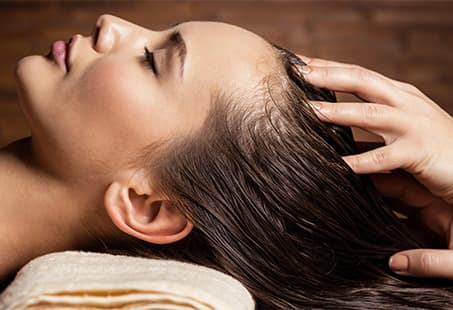The skin covering our skull, known as the scalp, often takes a backseat in our skincare routines. However, just like the skin on our face and body, the scalp is vulnerable to various ailments and imbalances. Maintaining a healthy scalp is not only essential for optimal hair growth but also for overall skin health.

In this article, we’ll delve into the tell-tale signs of scalp imbalances and discuss treatments for various conditions to help you maintain a healthy head of hair.
1. Recognizing the Signs of Scalp Imbalances
A healthy scalp is generally characterized by clean, smooth skin with no flakes, sores, or excessive oiliness. Here are some symptoms indicating that your scalp might be imbalanced:
- Dandruff: White, oily flakes of dead skin that dot your hair and shoulders.
- Dry Scalp: Itching, flaking, and tightness are indicative of dry skin on the scalp.
- Excess Oil: Greasy hair, even after washing, suggests overactive sebaceous glands.
- Redness and Irritation: This can be accompanied by a stinging sensation.
- Hair Thinning or Loss: Often related to underlying scalp conditions.
- Scaly Patches: Raised, red, and sometimes ring-like patches.
2. Conditions Affecting Scalp Health
a) Seborrheic Dermatitis (Dandruff)
- Causes: It is believed to be caused by an overproduction of oil and the presence of a yeast called Malassezia. External factors like stress, hormonal changes, or cold weather can exacerbate it.
- Treatment: Over-the-counter shampoos containing ingredients like zinc pyrithione, salicylic acid, selenium sulfide, or ketoconazole can be effective. In severe cases, prescription-strength treatments may be needed.
b) Psoriasis
- Causes: An autoimmune condition where skin cells grow too quickly, leading to scaly, raised patches.
- Treatment: Topical treatments like corticosteroids, vitamin D analogs, or coal tar can help. UV light therapy and systemic treatments might be necessary for severe cases.
c) Eczema
- Causes: An inflammatory skin condition often linked to genetics, environmental factors, or allergies.
- Treatment: Moisturizers, corticosteroid creams, or ointments can alleviate symptoms. Antihistamines can help reduce itching.
d) Folliculitis
- Causes: Inflammation of hair follicles, usually due to bacterial or fungal infections.
- Treatment: Antibacterial or antifungal shampoos and medications. Warm compresses can soothe the affected areas.
e) Tinea Capitis (Ringworm of the Scalp)
- Causes: A fungal infection.
- Treatment: Antifungal shampoos and oral antifungal medications.
3. Prevention and Maintenance
Good scalp health isn’t just about treating issues; it’s also about prevention. Here are some tips:
- Regular Cleansing: Use a gentle shampoo that matches your scalp type (oily, dry, sensitive).
- Scalp Massage: Boosts blood circulation and helps in distributing natural oils.
- Limit Chemical Treatments: Overuse of hair dyes, relaxers, or perms can irritate the scalp.
- Balanced Diet: Ensure you’re getting vitamins like A, C, E, and minerals like zinc and iron which promote scalp health.
- Stay Hydrated: Drinking enough water supports skin health, including that of the scalp.
4. When to See a Specialist
If you’ve tried over-the-counter solutions without success, or if your symptoms worsen, it’s time to consult a dermatologist or trichologist. Persistent itching, pain, or hair loss are especially concerning and warrant a professional’s attention.
The Anatomy of the Scalp
The scalp isn’t just skin; it’s a complex layer that houses hair follicles, sebaceous glands, blood vessels, and connective tissue. Its primary function is to provide a protective barrier and support for hair growth. Any imbalance in the scalp can disrupt its protective function and the growth and health of hair.
More on Seborrheic Dermatitis (Dandruff)
- Symptoms: Apart from the visible flakes, there may be redness, greasiness, and itching. In babies, this condition manifests as cradle cap.
- Contributing Factors: Besides the primary causes, factors like infrequent hair washing, alcohol-based hair products, and certain medications can aggravate dandruff.
Psoriasis vs. Seborrheic Dermatitis
Though these conditions may look similar, they are distinctly different:
- Psoriasis: Silver, scaly plaques often extend beyond the hairline. There might be a family history.
- Seborrheic Dermatitis: Yellowish, greasy scales, typically confined to the scalp and facial region. It can be chronic and recurring.
Scalp Eczema
- Symptoms: Itchiness, dryness, and small, white flakes. It can be exacerbated by sweat, stress, and changes in weather.
- Care Tips: Use lukewarm water for hair washing, minimize the use of hair styling products, and consider using a hypoallergenic shampoo.
Natural Remedies and Holistic Approaches
- Tea Tree Oil: Known for its anti-inflammatory and antifungal properties, it can be beneficial in addressing dandruff and folliculitis when diluted and applied.
- Aloe Vera: Offers soothing properties for irritated or inflamed scalps. Great for scalp hydration.
- Apple Cider Vinegar: Its acidic nature can help balance the scalp’s pH, making it less hospitable to fungi.
- Dietary Choices: Foods rich in omega-3 fatty acids (like salmon and flaxseeds) can help combat inflammation. Probiotics, found in yogurt and fermented foods, can help balance the skin’s microbiome.
Hair Care Habits Impacting Scalp Health
- Over-Washing: Daily shampooing can strip the scalp of its natural oils, leading to dryness and irritation.
- Tight Hairstyles: Regularly pulling hair into tight ponytails or braids can strain the hair follicles and lead to traction alopecia over time.
- Hot Tools: Over-reliance on hairdryers, straighteners, or curling irons can sap the scalp’s moisture.
The Link Between Stress and Scalp Health
Chronic stress can lead to a host of health issues, including those of the scalp. Stress can exacerbate dandruff, psoriasis, and eczema. Furthermore, conditions like telogen effluvium, where hair enters its shedding phase prematurely, can be stress-induced.
Understanding the complexities of the scalp and how various internal and external factors influence its health is crucial. While topical treatments and shampoos play a role, lifestyle factors like diet, stress management, and hair care habits are equally pivotal. Adopting a holistic approach to scalp care, encompassing both internal well-being and external treatments, will pave the way for a healthier scalp and, consequently, healthier hair.
